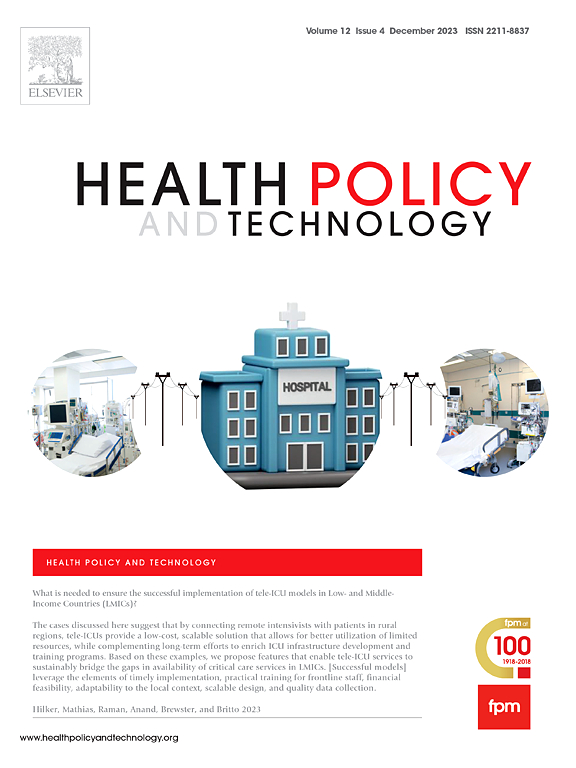缓和医疗的商业案例:将研究成果转化为中低收入国家(LMICs)的项目开发
IF 3.7
3区 医学
Q1 HEALTH POLICY & SERVICES
引用次数: 0
摘要
科学摘要提供姑息治疗是全面医疗保健的关键组成部分,特别是对于面临生命限制疾病的个人。虽然高收入国家已认识到姑息治疗的重要性,但在低收入和中等收入国家(LMICs)整合和实施姑息治疗带来了独特的挑战。在中低收入国家,有限的资源、相互竞争的卫生重点和文化因素历来阻碍了姑息治疗服务的发展和提供。然而,最近的研究表明,姑息治疗有许多好处,包括改善患者预后,提高生活质量和成本效益。要在中低收入国家成功地制定姑息治疗方案,需要采取多方面的方法。首先,需要提高决策者、卫生保健提供者和公众对姑息治疗的价值和益处的认识。这可以通过有针对性的宣传运动、能力建设倡议和知识传播来实现。其次,项目开发应因地制宜,针对每个低收入和中等收入国家的独特挑战和资源量身定制。这包括与当地卫生保健提供者建立伙伴关系,将姑息治疗纳入现有卫生保健系统,以及发展具有文化敏感性的护理模式。此外,必须探索融资机制和可持续的资金来源,以确保姑息治疗项目的长期可行性。这可能涉及倡导将姑息治疗纳入国家卫生政策,探索创新筹资模式,以及利用国际伙伴关系和筹资机会。摘要国际社会已经认识到,姑息治疗是全民健康覆盖和健康权的组成部分,有助于改善严重疾病患者及其照顾者/家庭的生活质量。虽然姑息治疗在较富裕国家已得到完善,但在低收入和中等收入国家实施姑息治疗仍具有挑战性。在中低收入国家,有限的资源使得难以提供姑息治疗。然而,最近的研究表明,姑息治疗带来了许多好处,例如更好的患者预后和成本效益。这些发现为在中低收入国家扩大姑息治疗提供了强有力的理由。为实现这一目标,需要提高决策者、卫生保健提供者和公众对姑息治疗价值的认识。我们还必须制定有针对性的方案,考虑到每个国家的独特挑战和资源。寻找可持续的资金来源至关重要,这可能涉及将姑息治疗纳入国家卫生政策并寻求国际伙伴关系。通过采用姑息治疗,中低收入国家可以改善重症患者的生活,加强其卫生保健系统,并满足其人口的需求。本文章由计算机程序翻译,如有差异,请以英文原文为准。
The business case for palliative care: Translating research into program development in low- and middle-income countries (LMICs)
Scientific abstract
The provision of palliative care is a critical component of comprehensive healthcare, particularly for individuals facing life-limiting illnesses. While the importance of palliative care has been recognized in high-income countries, its integration and implementation in low- and middle-income countries (LMICs) pose unique challenges. In LMICs, limited resources, competing health priorities, and cultural factors have historically hindered the development and delivery of palliative care services. However, recent research has demonstrated the numerous benefits of palliative care, including improved patient outcomes, enhanced quality of life, and cost-effectiveness.
A multifaceted approach is needed to develop palliative care programs in LMICs successfully. Firstly, there is a need to raise awareness among policymakers, healthcare providers, and the public about the value and benefits of palliative care. This can be achieved through targeted advocacy campaigns, capacity-building initiatives, and knowledge dissemination. Secondly, program development should be context-specific and tailored to the unique challenges and resources of each LMIC. This includes establishing partnerships with local healthcare providers, integrating palliative care into existing healthcare systems, and developing culturally sensitive models of care. Furthermore, financing mechanisms and sustainable funding sources must be explored to ensure the long-term viability of palliative care programs. This may involve advocating for the integration of palliative care into national health policies, exploring innovative financing models, and leveraging international partnerships and funding opportunities.
Public interest abstract
The global community has recognized that palliative care is integral to both universal health coverage and the right to health and helps improve the quality of life for people with serious illnesses as well as their caregivers/families. While it is well-established in wealthier countries, implementing palliative care in low- and middle-income countries (LMICs) is challenging. In LMICs, limited resources have made it difficult to provide palliative care. However, recent research shows that palliative care brings many benefits, such as better patient outcomes and cost-effectiveness. These findings make a strong case for expanding palliative care in LMICs. To make this happen, there is a need to raise awareness about the value of palliative care among policymakers, healthcare providers, and the public. We must also develop tailored programs that consider each country's unique challenges and resources. Finding sustainable funding sources is crucial, which may involve integrating palliative care into national health policies and seeking international partnerships. By embracing palliative care, LMICs can improve the lives of those with serious illnesses, strengthen their healthcare systems, and address the needs of their populations.
求助全文
通过发布文献求助,成功后即可免费获取论文全文。
去求助
来源期刊

Health Policy and Technology
Medicine-Health Policy
CiteScore
9.20
自引率
3.30%
发文量
78
审稿时长
88 days
期刊介绍:
Health Policy and Technology (HPT), is the official journal of the Fellowship of Postgraduate Medicine (FPM), a cross-disciplinary journal, which focuses on past, present and future health policy and the role of technology in clinical and non-clinical national and international health environments.
HPT provides a further excellent way for the FPM to continue to make important national and international contributions to development of policy and practice within medicine and related disciplines. The aim of HPT is to publish relevant, timely and accessible articles and commentaries to support policy-makers, health professionals, health technology providers, patient groups and academia interested in health policy and technology.
Topics covered by HPT will include:
- Health technology, including drug discovery, diagnostics, medicines, devices, therapeutic delivery and eHealth systems
- Cross-national comparisons on health policy using evidence-based approaches
- National studies on health policy to determine the outcomes of technology-driven initiatives
- Cross-border eHealth including health tourism
- The digital divide in mobility, access and affordability of healthcare
- Health technology assessment (HTA) methods and tools for evaluating the effectiveness of clinical and non-clinical health technologies
- Health and eHealth indicators and benchmarks (measure/metrics) for understanding the adoption and diffusion of health technologies
- Health and eHealth models and frameworks to support policy-makers and other stakeholders in decision-making
- Stakeholder engagement with health technologies (clinical and patient/citizen buy-in)
- Regulation and health economics
 求助内容:
求助内容: 应助结果提醒方式:
应助结果提醒方式:


